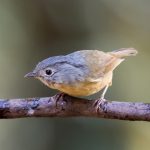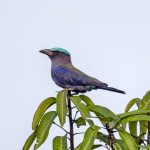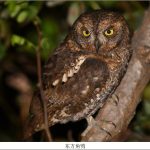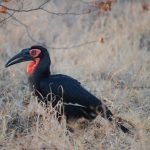If you have been birding for any length of time, you will almost certainly have built up a fine collection of field guides. To stay abreast of the current taxanomic thinking requires regular updating, but do we discard the old ones to leave space for the new? Do we bookcase! The laminated chipboard planks that house my collection groan under the weight of books written back in the days when the pinnacle of observational optics was a monocle. My African shelf for example seldom looks this neat, but how many of these books do I actually need?

Well all of them obviously! This is why second-hand field guides are so hard to find, because I have them all. A complete set of books for a given region will include at least one photographic account, one hand drawn volume and one for late-night perusal that contains all the extra information beyond the normal description, range, diet, habitat etc. Now add in the insect and mammal guides and the latest updates of all of them and see how much room is left in your carry-on bag for that overseas trip!
If you can bear to make space for one more book (perhaps by leaving out unnecessary items such as knickers and deodorant), may I suggest a small volume to help identify creatures that don’t present themselves in a perfect pose, but move about, skulk in the darkness or refuse to show their distinctive traits. Even those that look straight at you may not be instantly recognisable.
The Management at 10,000 Birds are asking for your participation to help put names to some of these frustrating puzzlers and will compile the results into a new and exciting book. Put names to these birds and win wonderful prizes (to be confirmed by The Management).

The book shall be named “10,000 Birds’ Guide to Uncooperative Little Suckers”, and will contain birds from all around the world. Usually they are common birds, just in a situation that makes them difficult to identify. In case you don’t get much chance to travel, 2 of the birds pictured here have counterparts across the globe with which they share some recogniseable trait, habit or GISS (jizz, gizz?). The other two may pose a challenge if you have not been further east than the Bay of Bengal.

Those amongst you who live in the Orient, or have visited, or own a field guide with the intention of maybe one day visiting, will probably find this very easy. Most of you will probably get to the regional equivalent and once you are in the ballpark, the options become limited.
Have fun.
Jochen has won the all expenses trip for two to Indonesia, but since he has just come back from there he will not be needing his prize, so Corey has kept the tickets for himself.
If you still want to have a go, please feel free. The answers can be found by clicking on the smaller pictures below.

















We think you have a jacana and a cuckoo in there! 🙂
@ Clare and Grant,
Well done with the cuckoo, but there are no jacanas.
We await the correct answers! No-one else is game to guess??!! 🙂
0kay, I’ll take a guess:
1. Juvi Cinnamon Bittern
2. Chinese or Javan Pond Heron
3. Cuckoo spec
4. Fantail spec, and that is a fabulous picture
But, but … where is the BROWN?
@Jochen, I agree they are all a bit gaudy.
A great attempt and so almost there, but no bitterns I am afraid. You are correct though in saying that the top one is a youngster.
Juvenile emu?
Well, I know from personal experience that the top one is not a juvenile Bornean Bristlehead (mwahahahaaaaar), so it’s just got to be a juvenile Striated Heron.
You see – I am “so almost there” because this is how all my birding is conducted and how all my photos of birds look.
http://10000birds.com/a-striated-heron-comes-into-our-garden.htm
@ Jochen-not totally convinced on that one! 🙂
Well done Jochen the prize is yours!
See Corey to collect your tickets for an all inclusive trip for two to Indonesia.
Oh wait a moment, you’ve just come back from there. Never mind.
Redgannet, I want a three-week trip to Ecuador in December to pulverize Corey’s ambitions of beating me in the year list competition. You think that’s a realistic thing to ask for?
@Jochen: No. No it is not.
Well, seeing as you lack any motivation whatsoever to win this competition, I won’t be needing this trip anyway. Why else haven’t you sent me your Germany wish list, yet?
I think the first bird is a striated heron. The second is a heron too probably one of the pond herons and since those lilypads look like vones I’ve seen in Singapore and Thailand I’ll plumb for Javan. The third I think is a hummingbird but not convinced and the last one? I guess Simon just shot a chicken with a 12 bore and then filmed the feathers falling. Did I win?